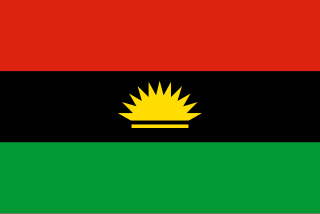
Biafra, officially the Republic of Biafra, was a partially recognised state in West Africa that declared independence from Nigeria and existed from 1967 until 1970. Its territory consisted of the former Eastern Region of Nigeria, predominantly inhabited by the Igbo ethnic group. Biafra was established on 30 May 1967 by Igbo military officer and Eastern Region governor C. Odumegwu Ojukwu under his presidency, following a series of ethnic tensions and military coups after Nigerian independence in 1960 that culminated in the 1966 anti-Igbo pogrom. The Nigerian military proceeded to attempt to reclaim the territory of Biafra, resulting in the start of the Nigerian Civil War. Biafra was formally recognised by Gabon, Haiti, Ivory Coast, Tanzania, and Zambia while receiving de facto recognition and covert military support from France, Portugal, Israel, South Africa and Rhodesia. After nearly three years of war, during which around two million Biafran civilians died, President Ojukwu fled to Ivory Coast in exile as the Nigerian military was approaching the capital of Biafra. Philip Effiong became the second president of Biafra, and he oversaw the surrender of Biafran forces to Nigeria.
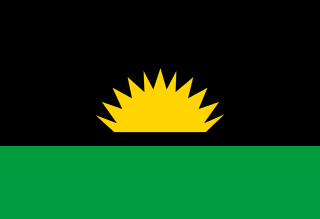
The Republic of Benin was a short-lived unrecognized secessionist state in West Africa that existed for seven hours in 1967. It was established on 19 September 1967 during the Nigerian Civil War as a puppet state of Biafra, following its occupation of Nigeria's Mid-Western Region, and named after its capital, Benin City, with Albert Nwazu Okonkwo as its head of government.
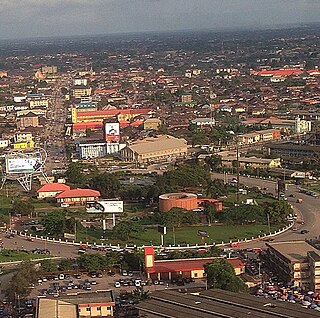
Benin City is the capital and largest city of Edo State, southern Nigeria. It is the fourth-largest city in Nigeria according to the 2006 census, after Lagos, Kano, and Ibadan. It is situated approximately 40 kilometres (25 mi) north of the Benin River and 320 kilometres (200 mi) by road east of Lagos. Benin City is the centre of Nigeria's rubber industry, and oil production is also a significant industry.
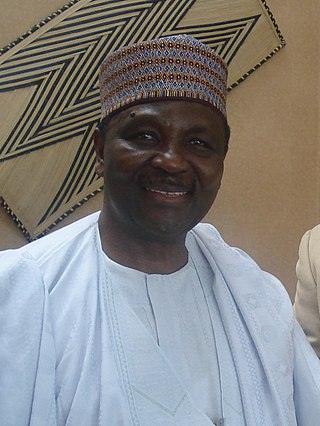
Yakubu Dan-Yumma "Jack" Gowon is a retired Nigerian army general and military leader. As head of state of Nigeria, Gowon presided over a controversial Nigerian Civil War and delivered the famous "no victor, no vanquished" speech at the war's end to promote healing and reconciliation. The Nigerian Civil War is listed as one of the deadliest in modern history, with some accusing Gowon of crimes against humanity and genocide. Gowon maintains that he committed no wrongdoing during the war and that his leadership saved the country.

The Nigerian Civil War, also known as the Biafran War, was a civil war fought between Nigeria and the Republic of Biafra, a secessionist state which had declared its independence from Nigeria in 1967. Nigeria was led by General Yakubu Gowon, while Biafra was led by Lieutenant Colonel Chukwuemeka "Emeka" Odumegwu Ojukwu. Biafra represented the nationalist aspirations of the Igbo ethnic group, whose leadership felt they could no longer coexist with the federal government dominated by the interests of the Muslim Hausa-Fulanis of Northern Nigeria. The conflict resulted from political, economic, ethnic, cultural and religious tensions which preceded the United Kingdom's formal decolonisation of Nigeria from 1960 to 1963. Immediate causes of the war in 1966 included a military coup, a counter-coup, and anti-Igbo pogroms in Northern Nigeria.
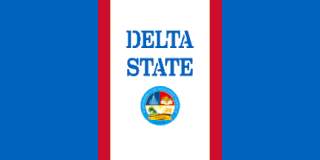
Delta State is a state in the South-South geopolitical zone of Nigeria. Named after the Niger Delta—a large part of which is in the state—the state was formed from the former Bendel State in August 27, 1991. Bordered on the north by Edo State, the east by Anambra and Rivers states, and that south by Bayelsa State while to the west is the Bight of Benin which covers about 160 kilometres of the state's coastline. The state was initially created with 12 local government areas in 1991 which was later extended to 19 and now has 25 local government areas. Asaba as its state capital located along the River Niger on the northeastern end of the state, while the state's economic center is Warri on the southwestern coastline.

Edo, officially known as Edo State, is a state in the South-South geopolitical zone of the federal republic of Nigeria. As of 2006 national population census, the state was ranked as the 24th most populous state (3,233,366) in Nigeria. The estimated state population is around 4,777,000 in 2022. Edo State is the 22nd largest State by landmass in Nigeria. The state's capital and largest city, Benin City, is the fourth largest city in Nigeria, and the centre of the country's rubber industry. Created in 1991 from the former Bendel State, it is also known as the heart beat of the nation. Edo State borders Kogi State to the north for 133 km and across the Niger River for 81 km to the northeast, Anambra State to the east for about four km across the Niger River, Delta State to the southeast and south for 350 km, and Ondo State to the west.
The Edoid languages are a few dozen languages spoken in Southern Nigeria, predominantly in the former Bendel State. The name Edoid derives from its most widely spoken member, Edo, the language of Benin City, which has 2 million native and secondary speakers.

George Agbazika Innih was a Nigerian Army general and statesman. He was the military governor of Bendel and Kwara States.
Federalism in Nigeria refers to the devolution of self-governance by the West African nation of Nigeria to its federated states, who share sovereignty with the Federal Government.
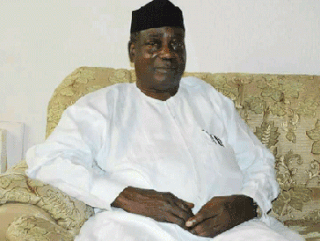
Samuel Osaigbovo Ogbemudia was a Nigerian army officer and politician. He was military Governor (1967–1975) of the Mid-West State, later renamed Bendel State, part of which in turn became Edo State After the return to democracy in 1999, he became a power in the Peoples Democratic Party (PDP). In September 2009, Governor Adams Oshiomhole of Edo state and others attended his 77th birthday celebration in Benin. He is noted as one of the founding fathers of the very prestigious University of Benin Teaching Hospital (UBTH)

Ambrose Folorunsho Alli was a Nigerian medical professor who served as Executive Governor of the defunct Nigerian state of Bendel State between 1979 and 1983. He was the first civilian governor.

Major (Dr.) Albert Nwazu Okonkwo was briefly the Military Administrator of the Mid-Western State of Nigeria in mid-1967 during an attempt to establish the region as the independent Republic of Benin early in the Nigerian Civil War. Okonkwo was a Major in the Biafran Army Medical Corps. He was trained as a physician in the United States, and was married to an American.
The Bendel Province is one of the fourteen ecclesiastical provinces of the Church of Nigeria. It comprises thirteen dioceses, each one headed by a bishop and it was created in 2002, when the current division into provinces was adopted. His headquarters are located in Asaba. The first Archbishop of the Bendel Province was Albert Agbaje, who died in 2005. He was succeeded by Nicholas Okoh, latter replaced upon his election as Primate of Nigeria by Friday John Imaekhai in 2010. In 2020 Cyril Odutemu became Archbishop of Bendel.
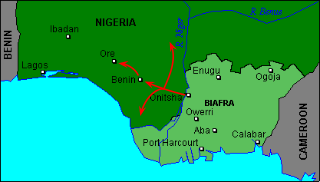
The Midwest Invasion of 1967 codenamed Operation Torch, was a military operation between Nigerian and Biafran military forces during the Nigerian Civil War. The invasion began on August 9 when 3,000 Biafran soldiers led by General Victor Banjo crossed the River Niger Bridge into Asaba. Upon reaching Agbor, the Biafrans split up. With the 12th Battalion moving west capturing Benin City and Ore, the 18th Battalion swung south, taking Warri, Sapele and Ughelli, while the 13th Battalion headed north for Auchi, Agenebode and Okene. Simultaneously, a plot to capture Mid-Western Governor David Ejoor at his home in Benin failed. Nevertheless, the Biafrans, meeting virtually no resistance, had seized the entire Mid-Western Region in less than 12 hours.
Adesuwa Onyenokwe is a Nigerian television personality. She was a former presenter at NTA before becoming an editor for the magazine "Todays Woman". She is a talk show host of the program "Seriously Speaking" which came on air in 2014. She is a motivational speaker and elocution trainer, living in Lagos Nigeria.
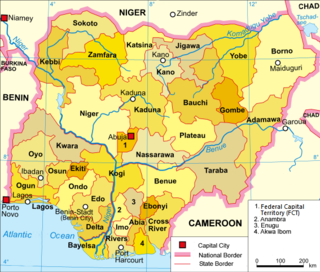
Lists of Nigerian state governors cover the governors of states of Nigeria. The governor heads the executive branch of the state government, and can appoint people to the State Executive Council subject to the advice and consent of the State House of Assembly (Legislature). The lists include a list of current governors, lists by state, lists by period and a list of governors of former states.
The Anglican Diocese of Lagos is one of 13 dioceses within the Anglican Province of Lagos, itself one of 14 provinces within the Church of Nigeria. The current bishop is Ifedola Senasu Gabriel Okupevi who succeeded the late Humphrey Bamisebi Olumakaiye.











